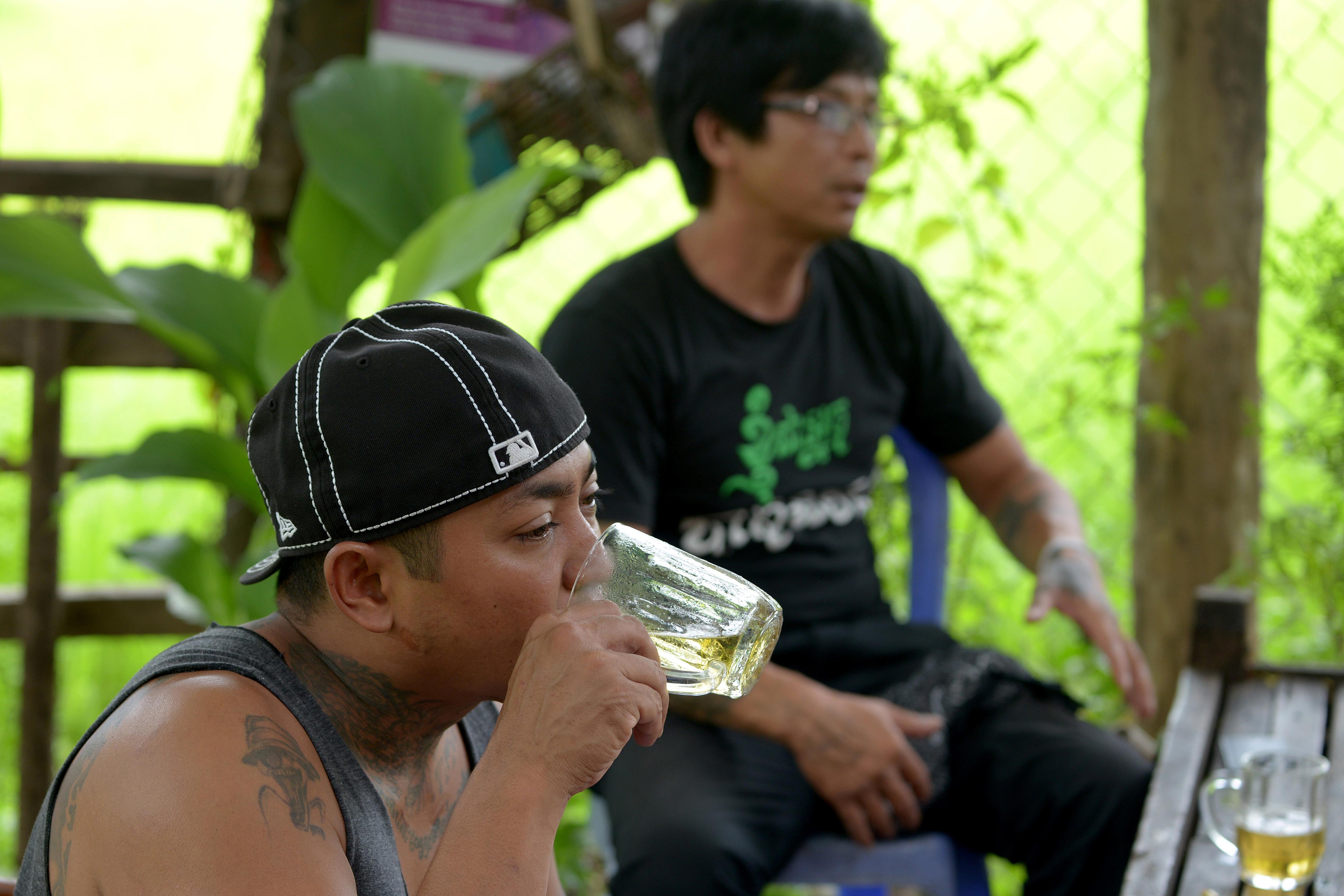Guzzling beer and pizza as hip-hop blasts from a stack of speakers, Kookie's thoughts drift back to America, a country that took him in as a child refugee from Cambodia but deported him to the kingdom years later for a criminal record.
Returning to the US is just a dream for the heavily tattooed Kookie and his fellow exiles, who are among hundreds of Cambodian refugees banished from the US after serving time for gang shootouts and other crimes committed as youths in America's tough inner cities.
"We don't remember shit (about Cambodia), really our minds is Americanised," said 41-year-old Kookie, one of seven so-called "Khmericans" shooting the breeze around a table in Cambodia's rural Battambang province.
"I'm here just in my body. My heart is over there," Vuthy Ing chimed in, eliciting nods of agreement from a group whose American street slang, elaborate inkwork and US-bred bulk sets them apart in their new home.
In between profanity-laced banter, the men sketch out emotionally raw stories of dislocation that span Thai refugee camps, gang violence in the US, prison and deportation back to one of Asia's poorest countries.
They are now back in the same rice fields their parents fled to escape Pol Pot's genocidal Khmer Rouge regime in the late 1970s.
But it is not a happy homecoming for the returnees.
They have been severed from their families and cast into the cultural wilderness of a country that views them as outsiders.
"It's hard to adjust because (locals) look at us as different...they say us is like a reject: 'you got a chance to go to America, why you get deported?'" explained Kookie, a charismatic Californian whose full name is Leach Chhoeun.
Cambodia has taken in 566 deportees since inking a 2002 pact with the US that opened the trap door on thousands of legal residents who had blots on their criminal records.
Authorities now want to revise a deal seen as a form of "double punishment" for deportees, many of whom were booted out years after finishing their prison sentences.
But unpicking the agreement is unlikely with President Donald Trump talking tough on immigration and immigrants with criminal pasts.
Twenty-eight Cambodian deportees have arrived since the start of the year, with some 2,000 others currently on the deportation list.
"Now that Trump is in The House, nothing is gonna change," said Kookie, pouring another round of beer.
Asian Boyz
The Khmericans were newborns and toddlers when their families fled through mine-strewn jungle to escape the Khmer Rouge, which killed or starved to death nearly a quarter of Cambodia's population.
After years of languishing in Thai refugee camps, more than 100,000 Cambodians were granted asylum in the US.
America's embrace of the refugees was in part an act of atonement for carpet bombing Cambodia during the Vietnam War, destruction that helped set the stage for the Khmer Rouge's rise.
But life in the US was no fairytale for the traumatised refugees shunted into its crime-ridden cities.
As teenagers, many were swept into the gang wars barrelling through their poor urban communities in southern California, Massachusetts and Washington State through the 1980s and 90s.
Banding together became a means of survival in a world where gangs were cut along ethnic lines and anti-Asian sentiment festered following the Vietnam War.
"They all picked on us so we had to stick together for protection," said Kookie, a former member of the mainly Cambodian street gang the Asian Boyz.
The group was established in southern California in the 1970s, luring up to 2,000 members by 2009, according to the FBI.
Many Cambodian refugees never thought to apply for full citizenship after they were granted permanent resident status in the US.
It wasn't until years after they arrived, in 1996, that the US passed laws mandating deportation of non-citizens with a criminal record.
Some were put on planes straight from prison. Others were picked up years after they had served their sentences and turned their lives around.
"I was out for a long time. I had kids, 18 and ten years old," says Kookie, who was deported in 2014 for a shootout with a rival gang nearly two decades earlier.
The struggle is real
The Cambodian government does not provide support for the returnees, who arrive with few belongings and a poor grasp of the local language.
Most are shuttled through the Returnee Integration Support Centre (RISC), an NGO that provides temporary housing in the capital and helps with job training.
From there, their paths branch out. Some draw on their native English skills to land teaching gigs, remarry and start over in small businesses.
Others struggle to find their feet in an impoverished, graft-riddled country where employers are suspicious of their tattoos and chequered pasts.
"We had an individual who couldn't adjust to the new life so he hung himself," says Kem Villa, of the US-funded RISC. "Another one jumped off a bridge."
Battambang, a western province bordering Thailand, has become a hub for returnees who trickle back to the countryside to stay with distant relatives.
Van Vath, a soft-spoken 43-year-old from Seattle, has led the camaraderie among the group since he arrived in 2015, bringing them together for pizza and monthly bible readings.
"When I was young I was bad. Now I'm doing good. It was a whole flip for me," he told AFP, reaching a hand to the fading ink of a prison tattoo scrawled across his neck.
"I'm trying to get this removed for job opportunities," he explained.
Van has been working as a translator for Habitat for Humanity, a US-based volunteer group.
But the work is irregular and the pay is not enough to live on.
"The struggle is real," he said. "You know the term dog-eat-dog world? This is really it." – AFP
